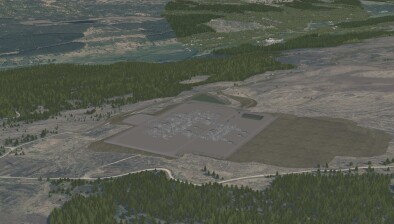New study highlights £450m contribution of quarried construction materials to Scottish economy

Daniel Johnson MSP speaking at the launch of the report (Image credit: David Cheskin)
The vast contribution of quarried construction materials to the Scottish economy has been highlighted in the findings of a new study published this week.
In the first report of its kind, The Economic Contribution of Primary Aggregates in Scotland reveals the scale and strategic importance of the quarried materials sector to the country’s prosperity, at a time when the industry prepares for the introduction of the new Scottish Aggregates Tax in April 2026.
Commissioned by the Mineral Products Association Scotland (MPAS), which represents producers of crushed rock, gravel and sand, the study shows that in 2024 the sector generated £450 million Gross Value Added (GVA) and supported 4,930 Scottish jobs.
Edinburgh-based consultancy BiGGAR Economics, which conducted the study, also report that the industry generated £99.1m in tax contributions in Scotland, including £60m from the existing UK Aggregates Levy.
Accounting for the biggest flow of materials by volume in Scotland’s economy, primary aggregates are those quarried from naturally occurring mineral deposits and used for the first time, supplemented where readily available by recycled materials arising from demolition and excavation, such as crushed concrete.
The report highlights that Scotland produces around 22 million tonnes of crushed rock and 5 million tonnes of sand and gravel each year, accounting for nearly one-fifth of UK production.
With GVA per head at £113,850, productivity in the aggregates sector is significantly above the Scottish average of £74,420, reinforcing its role as a high-value, high-productivity industry that anchors employment in rural communities. Local supply also helps retain spending and tax revenues within Scotland, avoiding the carbon emissions and cost impacts of long-haul imports such as steel.
More than 100 delegates attended a recent launch event at Prestonfield House, Edinburgh, including senior officials from the Scottish Government, Revenue Scotland, Scottish Renewables, Transport Scotland, Crown Estate Scotland, the University of Dundee and the RSPB.
Speaking at the event, Daniel Johnson MSP, shadow cabinet secretary for economy, business and fair work, said: “It’s vital that we recognise the fundamental role of the aggregates industry as a key enabler of infrastructure and growth in the Scottish economy.
“Hewn from the earth here in Scotland, these materials literally form the foundations and the fabric of our built environment, underpinning housing, public services, transport, and renewable energy developments such as grid upgrades and offshore wind. The Scottish Government must work with the industry to ensure a predictable regulatory environment.”
Alan Doak, director of MPA Scotland, said: “The findings in this report provide strong evidence as to the importance of the primary aggregates industry to Scotland’s infrastructure, economy and net zero ambitions. The forthcoming Scottish Aggregates Tax, which is only the third devolved tax to transfer from the UK Government, following Landfill Tax and Land & Buildings Transaction Tax, and future policy and fiscal decisions need to be informed by robust evidence and dialogue with producers to prevent another great Scottish manufacturing sector from being crushed whilst economic opportunities are lost.
“Crucially, there’s a misconception that Scotland has a readily available source of recycled materials waiting to be tapped into and – whilst the industry recycles whatever it can – there is a limited quantity of recycled aggregate available. We need a balanced, data-driven approach to ensure Scotland’s construction industry is properly supplied with the essential aggregates.”

















